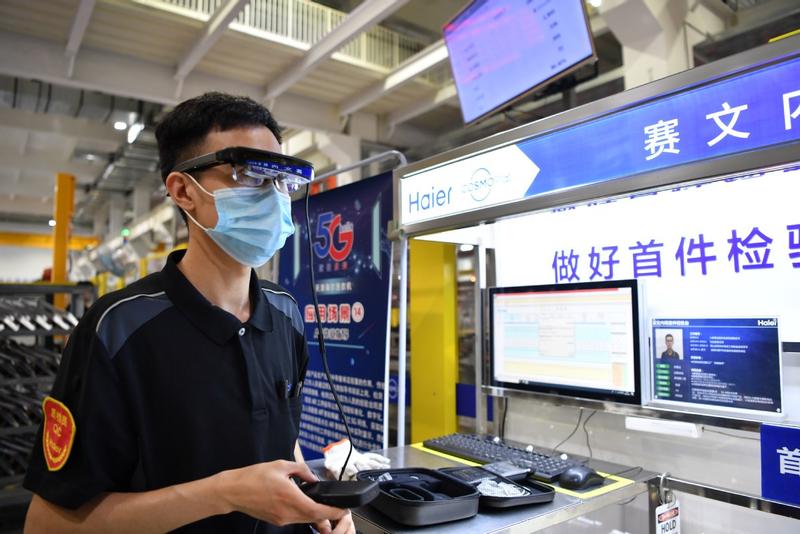 A visitor tries out a game supported by 5G and virtual reality technologies during an exhibition in Nantong, Jiangsu province, in July. (ZHAI HUIYONG / FOR CHINA DAILY)
A visitor tries out a game supported by 5G and virtual reality technologies during an exhibition in Nantong, Jiangsu province, in July. (ZHAI HUIYONG / FOR CHINA DAILY)
China has taken the lead in global 5G development, with nearly half of worldwide investment by the country this year, according to the latest reports.
A newly-launched report by market consultancy Gartner Inc said the country leads the world in 5G development and is expected to contribute 49.4 percent of 5G investment globally this year
A newly-launched report by market consultancy Gartner Inc said the country leads the world in 5G development and is expected to contribute 49.4 percent of 5G investment globally this year.
"Cost-effective infrastructure manufactured in China is paving the way for major communications service providers in the country to quickly build 5G coverage," said Kosei Takiishi, senior research director at Gartner.
Due to the COVID-19 pandemic, investment growth rates in 5G will be slightly lower worldwide this year but will rebound modestly next year, the report said.
" (The rebound next year comes) as communications service providers seek to capitalize on changed behaviors that are sparked by populations' elevated reliance on communication networks," it added.
The comments echo a recent survey by Swedish telecom equipment maker Ericsson which said that China's 5G development is speeding up this year, which was a contrast to the slowdown of 5G rollout and growing subscription rates in many markets.
Nearly 89 percent of Chinese consumers surveyed believe that 5G is set to play an increasingly bigger role in the future, while 59 percent showed willingness to buy 5G-related products and services, the survey said.
 A Haier employee checks products using a 5G-enabled system at a company facility in Tianjin in June. (LI RAN / XINHUA)
A Haier employee checks products using a 5G-enabled system at a company facility in Tianjin in June. (LI RAN / XINHUA)
Currently, the country's three major telecommunications carriers-China Mobile, China Unicom and China Telecom-are spending big and plan to invest more this year in 5G construction.
ALSO READ: China Mobile to build private 5G networks for faster industrial application of tech
The total expenditure budget of the three major operators this year is 334.8 billion yuan (US$48.1 billion). Of that amount, the 5G-related capital expenditure budget hit 180.3 billion yuan. The 5G expenditure accounted for 53.9 percent of the total budget and will be a 337.6 percent increase year-on-year.
"China has actively promoted 5G construction and local consumers are also holding an open mind to embrace the technology, which laid a relatively solid foundation for 5G development in the country," said Zhang Jin, a researcher from the China Center for International Economic Exchanges.
While China remains the world's largest 5G market, Zhang pointed out that the country's efforts in driving 5G-related industrial funds and industrial chain development have also boosted the nation's competitiveness in the sector.
A report by the China Academy of Information and Communications Technology pointed out that China's efforts in 5G commercialization will directly drive an investment of 900 billion yuan this year.
While total 5G investment will reach 1.5 trillion yuan over the next five years, it will help create more than 3.5 million jobs by then. By 2030, the superfast 5G will help create a total economic output of 6.3 trillion yuan, the report said.
To gear up new growth engines, China also called for new infrastructure construction including 5G, artificial intelligence and the industrial internet. Such efforts are in line with the nation's drive to ensure stability in domestic and foreign investment.
"New infrastructure comes with huge opportunities," said Kaifu Lee, a prominent AI expert who is chairman and CEO of venture capital firm Sinovation Ventures.
READ MORE: 'China boost' drives 5G usage
"During the process, AI, together with other core areas of new infrastructure such as 5G, big data and the industrial internet, will integrate much more closely with each other. This will take the digitalization of the nation's traditional industries to a new level," he said.


